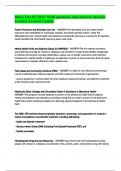Rules Test D3 2024 With questions and answers Already
Graded A Latest Update
Patient Protection and Affordable Care Act - ANSWER>>The Affordable Care Act makes health
insurance more affordable for individuals, families, and small business owners. Under the
Affordable Care Act, mental health and substance use disorder services are among the 10 essential
health benefits that most health insurance plans must cover.
Mental Health Parity and Addiction Equity Act (MHPAEA) - ANSWER>>The Act requires insurance
plans offering coverage for mental or substance use disorders to make these benefits comparable
to medical and surgical coverage. Deductibles, copays, out-of-pocket maximums, and treatment
limitations for mental health or substance use disorders must be no more restrictive than the same
requirements or benefits offered for other medical care.
Faith-Based and Community Initiatives (FBCI) - ANSWER>>a model for how effective partnerships
can be created between federal programs and faith-based and community organizations.
- several programs in mental health services, substance abuse prevention, and addiction treatment
at the national, state, and local levels
Historically Black Colleges and Universities Center of Excellence in Behavioral Health -
ANSWER>>This program recruits students to careers in the behavioral health field to address
mental and substance use disorders, providing training that can lead to careers in the behavioral
health field, and/or preparing students for obtaining advanced degrees in the behavioral health
field.
The HBCU-CFE activities should emphasize education, awareness, and preparation for careers in
mental and substance use disorder treatment, including addressing:
- Opioid use disorder treatment
- Serious mental illness (SMI) (including First Episode Psychosis (FEP), and
- Suicide prevention.
Homelessness Programs and Resources - ANSWER>>elp prevent and end homelessness among
people with mental or substance use disorders. Men, women, youth, and families living with mental
,or substance use issues may need treatment, case management, and discharge planning in addition
to financial support (e.g., employment assistance, Housing First programs, targeted rental/housing
subsidies) to avoid or escape homelessness. Being homeless, no matter how long it lasts, is a life-
altering traumatic event that creates major stress in any person's life, regardless of age.
Interagency Task Force on Trauma-Informed Care - ANSWER>>Interagency Task to develop best
practices for trauma-informed identification, referral, and support.
To identify, evaluate, and make recommendations regarding:
(1) best practices with respect to children and youth, and their families as appropriate, who have
experienced or are at risk of experiencing trauma
(2) ways in which Federal agencies can better coordinate to improve the Federal response to
families impacted by substance use disorders and other forms of trauma.
Interdepartmental Serious Mental Illness Coordinating Committee - ANSWER>>Interdepartmental
Serious Mental Illness Coordinating Committee (ISMICC) was established to make recommendations
for actions that federal departments can take to better coordinate the administration of mental
health services for adults with a serious mental illness or children with a serious emotional
disturbance.
Knowledge Application Program (KAP) - ANSWER>>KAP supports the professional development of
behavioral health workers and provides information and resources on best practices.
empowers treatment and service providers by offering evidence-based knowledge and information
about best practices to use in the field. These professionals, in turn, help individuals with substance
use problems reclaim their lives.
Charitable Choice - ANSWER>>strengthen the capacity of faith-based and other neighborhood
organizations to deliver services effectively to those in need and provide people with a choice of
SAMHSA-supported substance use prevention and treatment programs.
, Americans with Disabilities Act (ADA) - ANSWER>>establishes requirements for equal opportunities
in employment, state and local government services, public accommodations, commercial facilities,
transportation, and telecommunications for citizens with disabilities, including people with mental
illnesses and addictions.
Protection and Advocacy for Individuals with Mental Illness (PAIMI) Program - ANSWER>>protects
the rights of adults with serious mental illness and children or youth with serious emotional
disturbance in the community as well as in care and treatment facilities. The program also protects
those who are at risk for abuse, neglect, or rights violations. Under the Act, governor-designated
protection and advocacy systems located in each state, territory, and the District of Columbia
receive grant funds from SAMHSA to support protection and advocacy services.
The Developmental Disabilities Assistance and Bill of Rights Act (DD Act) - ANSWER>>requires the
HHS Secretary to submit a biennial report on the goals and outcomes for the Protection and
Advocacy (P&A) programs. These reports are submitted to the President, Congress, and National
Council on Disability every two years and identify the goals and outcomes of P&A programs.
Health Insurance and Portability and Accountability Act of 1996 (HIPAA) - ANSWER>>empowers
consumers with privacy rights and protections regarding their health information, including control
over how health information is used and disclosed by health plans and providers.
Alcohol and Drug Abuse Patient Records Privacy Law - ANSWER>>specifies restrictions concerning
the disclosure and use of patient records that include information on substance use diagnoses or
services.
Synar Amendment - ANSWER>>requires states, territories, and the District of Columbia to enact and
enforce laws prohibiting the sale or distribution of tobacco products to individuals under the age of
18
Medication-Assisted Treatment (MAT) - ANSWER>>is the use of medications, in combination with
counseling and behavioral therapies, to provide a "whole-patient" approach to the treatment of
substance use disorders.




